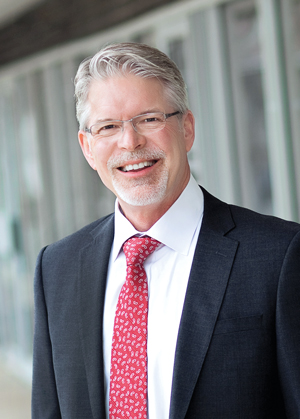A Closer Look: Michael Staebell
Compliance specialist and legal paraprofessional, Dickinson Mackaman Tyler & Hagen P.C.

When Jeffrey Krausman of Dickinson, Mackaman, Tyler & Hagen P.C. decided that the firm’s clients would welcome authoritative advice on labor laws — and wouldn’t mind saving some money — he decided to recruit one of Iowa’s experts on labor laws: Michael Staebell.
Staebell is Dickinson Law’s new compliance specialist and legal paraprofessional. He spent 33 years helping employers sidestep trouble with the U.S. Department of Labor before retiring from the department in December.
“This was an easy decision,” said Krausman, president of the firm. “We have an active labor and employment law practice, and have run across Mike in a number of situations at the Department of Labor when he was the Wage and Hour Division supervisor. He’s given a number of speeches at events we’ve attended. When we heard he was retiring, we pursued him. My biggest fear was that someone else would get him first.”
“There is nobody that I can think about in town who can better help us answer the question ‘How would the Department of Labor look at this problem?’ than Mike,” Krausman said. “It’s a tremendous opportunity to provide a valuable service to a client at a very reasonable price.”
That reasonable price results in part from the fact that Staebell is not a lawyer, Krausman said. Staebell can research questions and provide his expert advice to the firm outside the normal billable hours of the attorneys, Krausman said.
Staebell started his new job April 4. We stopped by the Dickinson office to admire the view of Principal Park and to ask Staebell a few questions. One of those questions: How often are there significant changes in regulations? “It depends on the administration,” Staebell said. “In the past three or four years, each year there has been at least one big change in federal labor law.” Keep in mind this interview was conducted before the DOL announced sweeping changes in regards to overtime pay. Nice timing, right?
Where did you work after graduating?
I bounced around and did various things. I was fortunate enough to get on with the federal government. Ultimately, I found my way to the Department of Labor. For 17 years, I was an on-site investigator. That’s the position that will visit the employer and review their policies to determine if they are in compliance with a large set of federal laws — 50 different statutes (enforced by) the Wage and Hour Division (of the U.S. Department of Labor). I had to make the call and decide what steps the firms had to take to correct any problems.
I was in Waterloo for about 13 years doing that in a one-person office. In 1999, I was promoted to assistant director and moved to Des Moines to what they call their district office. In 2010, I was promoted to director of the district, which includes Iowa and Nebraska. I retired on Dec. 31, 2015.
One of the things I was heavily involved in was the training of internal folks on new laws and regulations. They had extensive new-hire training, which I helped design. I was a regular instructor for the new hires.
Did you intend to retire altogether?
No. I knew I would be doing something. I did a lot of public presentations for the department. My name got out there. I was seriously thinking about going out on my own. I had four or five gigs between the time I retired and when I started here.
What did you think when you learned of the Dickinson position?
This is just fabulous. I was enthused from the beginning.
What is your vision for this job?
In many respects, my work isn’t going to change. I have made sure people know what the law is and that they are going to obey the law. I am going to continue on. I will be working with clients to make sure they understand what the rules are and that they are following them. The rest of this is how that is done. It might be someone who gets a letter from the department that says they are going to visit in a couple of weeks. I can help them get ready. In rare cases, it might be expert witness type of work. I expect to be out in the public eye speaking.
Are the Department of Labor visits periodic, or are they based on complaints?
They are primarily based on complaints, but not entirely. The last 15 years, the Wage and Hour folks have mixed complaint-based investigations with targeted sampling. There will be an industry that is the eye of the department. The statistics show the industry has a problem paying the people properly. The department might say, Des Moines, go out and do 15 restaurant inspections next year.











